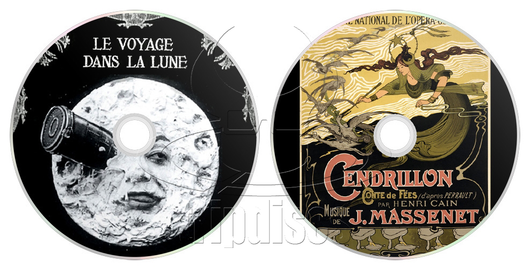Le voyage dans la lune (A Trip to the Moon) (1902) Cendrillon (Cinderella) (1899) Short, Adventure, Drama, Fantasy (DVD)
Regular price
£5.99
Sale

Le voyage dans la lune (A Trip to the Moon) (1902) Short, Adventure, Fantasy
Directed by: Georges Méliès.
Starring: Georges Méliès, François Lallement, Jules-Eugène.
A Trip to the Moon is the most famous of the over 500 short films produced by cinema pioneer Georges Méliès betwen 1896 and 1912, and its signature image of a bullet-shaped rocket lodging itself in the eye of a smirking moon is one of the most recognizable images in cinema history. An accomplished magician, Méliès moved from simple recordings of his stage shows to dazzling fantasy epics which were among the first narrative films ever made. These "trick films" combined fantastic yarns, intricate painted sets, and elaborate costumes with such simple but effective special effects as slow motion, dissolves, and superimpositions. Like Méliès's other long films of the period, Trip to the Moon is composed of a series of tableaux, each featuring chaotic action and multiple camera tricks photographed with a stubbornly static camera, which work together to tell a simple story. It proved sensationally popular with audiences, though Edwin S. Porter's The Great Train Robbery rode a slightly more sophisticated narrative to greater success the following year. As one of the earliest examples of cinematic fantasy, A Trip to the Moon paved the way for such filmic flights of fancy as The Wizard of Oz and Star Wars, as it proved that the seduction of the audience through special effects has roots deeper than the blockbusters of the Seventies.
Cendrillon (Cinderella) (1899) Short, Drama, Fantasy
Directed by: Georges Méliès (uncredited).
Starring: Barral, Bleuette Bernon, Carmely.
Cinderella (French: Cendrillon) is an 1899 French film directed by George Méliès, based on the fairy tale by Charles Perrault. It was released by Méliès's Star Film Company and is numbered 219–224 in its catalogues, where it is advertised as a grande féerie extraordinaire en 20 tableaux.
Méliès modeled the film's visual style on the engravings of Gustave Doré, who had illustrated the story for an edition of Perrault's fairy tales. (Doré was stylistically influential across Méliès's career, especially in this film and in his film adaptations of four other works Doré had illustrated: Red Riding Hood, Blue Beard, The Wandering Jew, and Baron Munchausen's Dream.) The direct inspiration for the film of Cinderella was probably a stage adaptation premiered in 1896 by the Théâtre de la Galerie-Vivienne and played by the Troupe Raymond at Méliès's own theatre of illustions, the Théatre Robert-Houdin, at Christmastime of 1897; Méliès may also have been inspired by the Théâtre du Châtelet's lavish 1895 stage production of the story.
Cinderella was Méliès's first film with multiple scenes (tableaux), using six distinct sets and five changes of scene within the film. (His catalogue, by dividing the action into smaller beats, lists twenty tableaux within the film, a generous numbering probably devised for publicity reasons.) So many extras were used in Cinderella that Méliès designated a Chief Extra to lead them.
Runtime: 5 Minutes 35 Seconds.
Contained in: Transparent Plastic Wallet.
Format: Either PAL or NTSC (depending on world location), Region 0 (Multi-Region/Worldwide).



